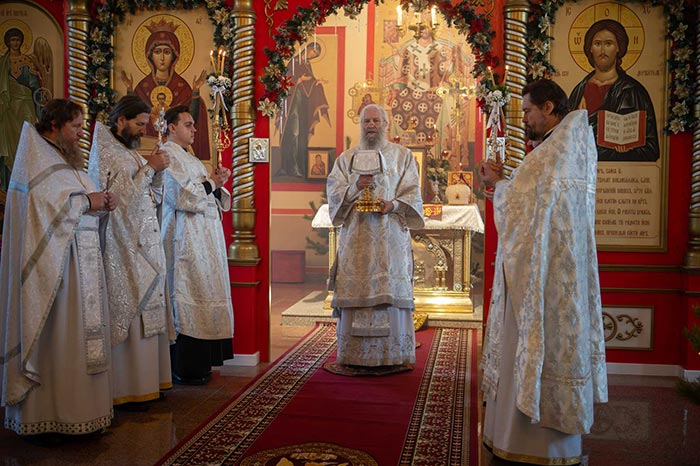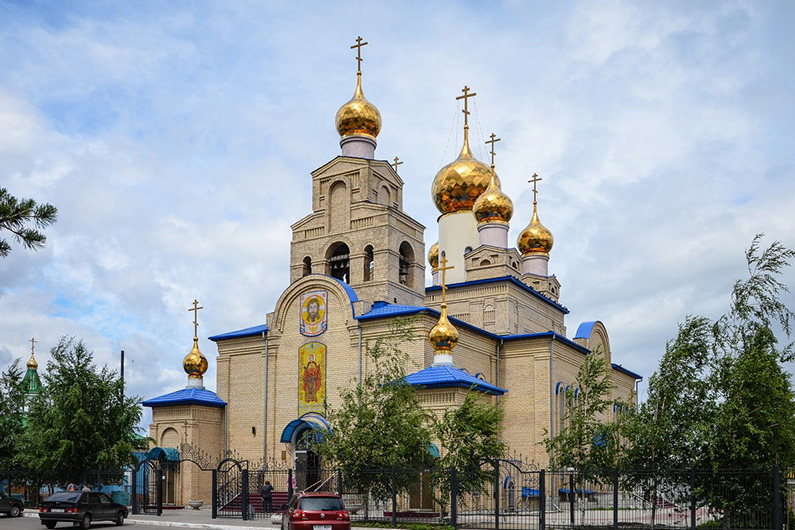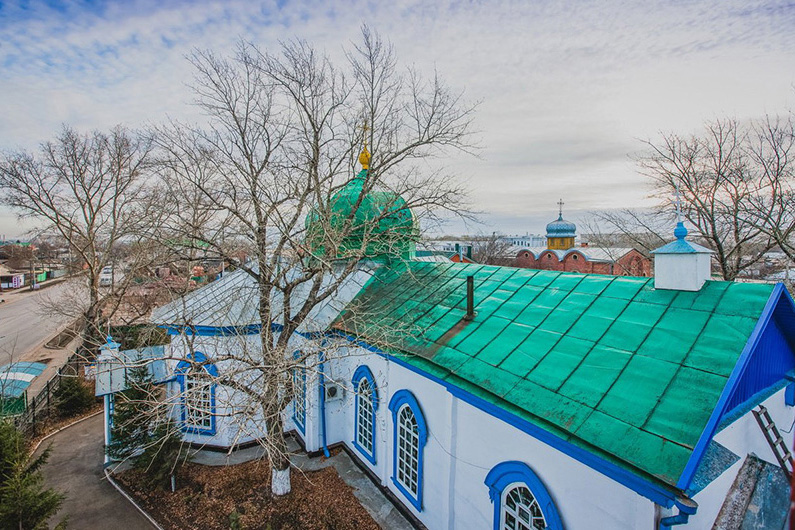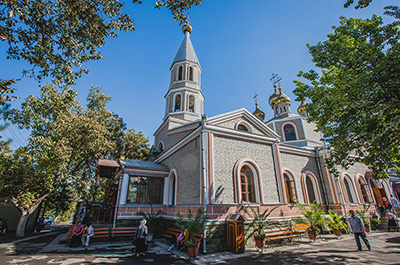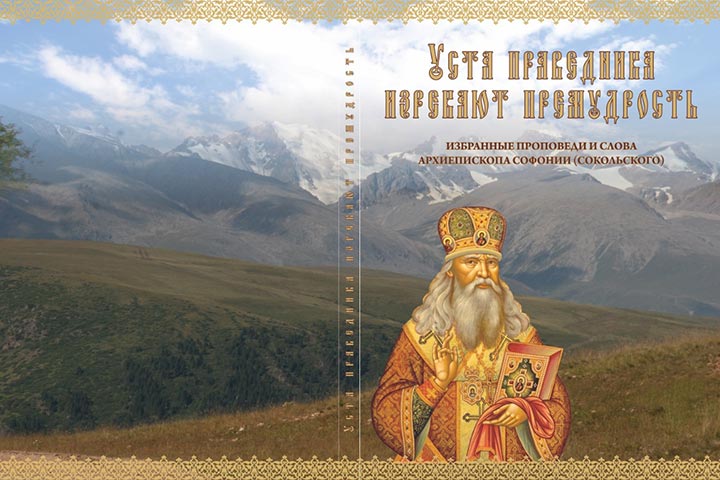
Word from Metropolitan Alexander of Astana and Kazakhstan at the opening of the exhibition dedicated to Archbishop Zephaniah (Sokolsky)
- 13.12.2023, 16:34
- Новости на английском языке

Your Eminences! All-honorable fathers, dear brothers and sisters!!
On the day of remembrance of Apostle Andrew the First-Called in the spiritual and cultural center of the Kazakhstan Metropolitan District, we are opening an exhibition dedicated to the Apostle of the Great Steppe, the first archpastor of the Turkestan diocese - Archbishop Zephaniah (Sokolsky).
With this event we close the year of celebration of the 20th anniversary of the establishment of the Metropolitan District on Kazakhstani soil - the Orthodox Church of Kazakhstan. And the coming year is marked by the 225th anniversary of the birth of the ever-memorable Bishop Zephaniah.
The creation of the Metropolitan District was a natural result of the centuries-long existence of Orthodoxy in this ancient land, where the Gospel truth was proclaimed in ancient times, at the dawn of the Christian era. There were many preachers and educators here, but the history of the establishment and active development of the Orthodox Church in Central Asia begins precisely with the activities of Saint Zephaniah. This great worker in the field of Christ arrived here at the age of 70. One of the eyewitnesses of the bishop’s deeds wrote: “As a young man, he rushed across the expanses of the Great Steppe, founding churches and establishing parishes, calling the people of God to saving faith in Christ.” The elder archbishop strove in deed and word to ignite the life-giving fire of faith in the hearts of his flock, built churches, tirelessly performed divine services and preached the word of God without laziness.
Bishop Zephaniah, being a very well-read, educated, erudite man in all respects, gained respect in the highest circles, his deep knowledge of the Koran and Arabic language allowed him to win over both the religious leaders of Islam and ordinary Muslims. The Bishop’s expressive and wise words and sermons made a very vivid impression on people. Wherever Bishop Zephaniah served, everywhere he presented the image of a wise hierarch, an example of moral purity and spiritual strength. He was an ascetic of piety, a true ascetic who did not want anything personal, who lived entirely for Christ and His Holy Church. All his time was divided between prayer, fatherly concerns for his flock and difficult administrative work. The personality of the bishop became an example for clergymen performing church work on the southern border of Christian civilization.
Archbishop Zephaniah knew many languages, was fluent in Italian and French, translated from Greek and Syrochaldean. The saint left behind a rich intellectual and spiritual heritage, a significant part of which were his addresses, sermons, words and speeches. Two volumes of sermons were published during the life of the hierarch in 1876.
Specialists of the Metropolitan District do not stop scientific research; Ongoing research leads to the discovery of new documents that reveal hitherto unknown personality traits of Archbishop Zephaniah. We have memories of him, which were recorded by his contemporary and co-worker, Archpriest Mikhail Putintsev. The shepherd has preserved for us many of the sayings of the saint himself. There is a wonderful research article about him in a biographical dictionary edited by Alexander Polovtsov at the beginning of the 20th century. There are modern studies devoted to his life and works, which, unfortunately, are either a retelling of the life story of St. Zephaniah, or somewhat expand its scope by considering individual archival documents.
At the moment, over the past three years, especially in the last six months, it has been possible to collect the most extensive archival material about the works of St. Zephaniah. Employees of our diocese and seminary discovered and copied four of his service records for 1847, 1855, 1863, 1872, which researchers have not accessed for almost the last 100 years. Among the most important finds, the full texts of Archbishop Zephaniah’s reports on the Turkestan diocese for 1872, 1873, 1874 and 1876 should be mentioned. These reports to St. Petersburg clarify many aspects of the works of the archpastor, who received the Turkestan diocese with 27 churches and 2 houses of worship, left it to his successors 5 years later with 40 consecrated churches and 4 more under construction.
No less significant are the finds of autographs of letters from St. Zephaniah to various persons, as well as individual letters addressed to himself. Initially, only a letter from St. Ignatius (Brianchaninov) to the bishop was known. Now we have the texts of 4 letters to Saint Zephaniah from his friend and classmate at the St. Petersburg Theological Academy, Bishop Porfiry (Uspensky), founder of the Russian Ecclesiastical Mission in Jerusalem. But, more importantly, copies of autographs of response letters were found that characterize St. Zephaniah as a wise, thoughtful person with sincere and ardent faith.
In addition to the three letters already published, two new letters from Saint Zephaniah to Saint Innocent (Borisov), the prayer book of the Kherson land, were discovered. These two letters were copied, it turned out that our access to these historical documents was the first in the last 150 years. Namely, in one of these letters, the bishop perspicaciously says that Saint Innocent will be worthy of glorification among the saints and will stand before the Throne of the Lord in the host of the righteous.
We also have at our disposal the full text of the 1872 letter from Archbishop Zephaniah to Metropolitan Isidore (Nikolsky) of St. Petersburg and Novgorod, the first member of the Holy Synod, who was the mentor of the future Turkestan hierarch both during his years of study at the Theological Academy and during the years of his rectorship at the Mogilev seminary. In this letter, Bishop Zephaniah writes to his older brother about his first impressions of his work at the bishop’s see in Central Asia.
We also have a letter from 1848 from Constantinople to Konstantin Stepanovich Serbinovich, director of the office of the Holy Synod, where Saint Zephaniah expresses concern about the issue of joining the Nestorians living in the north of the Ottoman Empire to Orthodoxy. All these letters, along with the already available copies of letters from Archbishop Zephaniah to his fellow student at the Academy, Bishop of Nizhny Novgorod Jeremiah (Soloviev) (in schema - John), constitute a significant corpus of texts that can be published with high-quality scientific commentary and shed light not only on individual traits of the character and life of our Turkestan ascetic, but also on individual hitherto unknown facts of church life of that time. There are many other documents that were found in the archives and copied. Among such historical papers is the correspondence of St. Zephaniah with Prince P.A. Vyazemsky, who was A.S.’s best friend. Pushkin until the death of the poet.
Every new letter, new archival document shows Saint Zephaniah as an authoritative spiritual mentor and ascetic of piety. “the one who believes in me will live, even though they die” (John 11:25), says the Lord, therefore His worthy servants - archpastors and shepherds, monastics and laity - are alive and triumphant in eternity. Their names are inscribed in golden letters in the history of Orthodoxy in Kazakhstan. “Remember your leaders, who spoke the word of God to you. Consider the outcome of their way of life and imitate their faith” (Heb. 13:7), commands the Apostle Paul. The image of Saint Zephaniah, the example of his sacrifice and hard work, has enormous moral power and demonstrates the truth of the Gospel of Christ.
Our sacred duty is to carefully preserve the memory of Bishop Zephaniah, who through his labors contributed to the spread of God’s truth in the ancient Kazakhstani land and gave his life to the service of the Holy Church.
Eternal and grateful memory to Archbishop Zephaniah of Turkestan and Tashkent - an ascetic of piety, a preacher of truth, a zealous worker in the field of Christ, an apostle of the Great Steppe and Semirechye.






